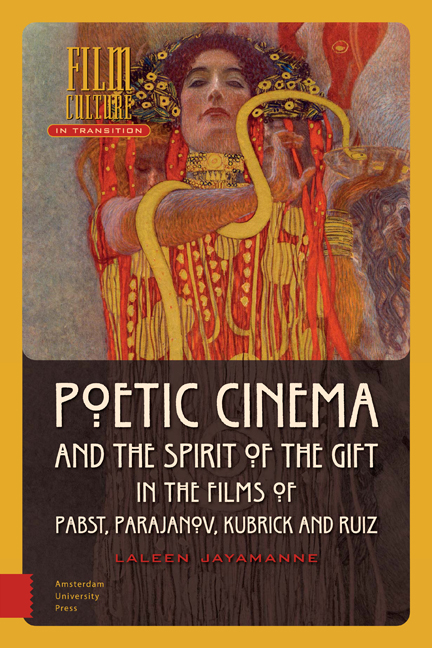Book contents
- Frontmatter
- Dedication
- Contents
- Foreword: In Memory of Thomas Elsaesser
- Introduction: Spirit of the Gift: Cinematic Reciprocity
- 1 A Gift Economy: G. W. Pabst’s Pandora’s Box (1929)
- 2 Fabric of Thought: Sergei Parajanov
- 3 Nicole Kidman in Blue Light: Stanley Kubrick’s Eyes Wide Shut (1999)
- 4 Ornamentation and Pathology: Raúl Ruiz’s Klimt (2006)
- Afterword: Poetics of Film Pedagogy
- Bibliography
- Filmography
- About the Author
- Index
Afterword: Poetics of Film Pedagogy
Published online by Cambridge University Press: 13 April 2021
- Frontmatter
- Dedication
- Contents
- Foreword: In Memory of Thomas Elsaesser
- Introduction: Spirit of the Gift: Cinematic Reciprocity
- 1 A Gift Economy: G. W. Pabst’s Pandora’s Box (1929)
- 2 Fabric of Thought: Sergei Parajanov
- 3 Nicole Kidman in Blue Light: Stanley Kubrick’s Eyes Wide Shut (1999)
- 4 Ornamentation and Pathology: Raúl Ruiz’s Klimt (2006)
- Afterword: Poetics of Film Pedagogy
- Bibliography
- Filmography
- About the Author
- Index
Summary
Directing films, writing about film in a speculative and ludic spirit, and teaching film-making were all part of a most unusual composite aesthetic practice for Raul Ruiz. Film, in some rather rare instances (as in Louise Brooks's Lulu), has eluded capture by commerce even as it is an essential part of its life. The directors studied in this book have been animated by a singular belief in film as a form of life, a non-organic life. As such, financial profit, while desirable and essential to all but Parajanov, has never been the primary driving force in these directors’ exploration of the medium's vitality. These directors have widened the expressive powers of film and the variety of forms available to cinema and thereby deepened our understanding of what is thinkable as film and with film.
Ruiz as pedagogue was the most articulate on this approach to filmmaking. Alejandra Rodriguez-Remedi provides a detailed account of Ruiz's long practice as a teacher in several continents, from 1969 at the Film Institute of the Pontifical Catholic University in Santiago, Chile, to the University of Aberdeen in Scotland between 2007 and 2009. Ruiz said that he was able to work on more commercial, big-budget films on the condition that he had spent time making films without commercial constraints. He wanted to have the time to experiment as well as have time for trial and error. Ruiz used his teaching as a way to experiment with film in collaboration with his students. Adrian Martin has also provided us with a detailed account of Ruiz's unusual pedagogic practice of combining freedom with a certain rigour, by examining the compilation film (edited by Ruiz's wife, Valeria Sarmiento), documenting a workshop he conducted in Chile in 1990. The great Soviet film-makers also had similar unique pedagogical visions (in their theory and practice), as I have touched on in Chapter Two on the cinema of Parajanov. Film, for Ruiz especially, was a medium to be explored with a curious mind. He shuttled between the experimental workshop exercises and films and the commercial big-budget modes of film-making with agility and great conviction.
- Type
- Chapter
- Information
- Poetic Cinema and the Spirit of the Gift in the Films of Pabst, Parajanov, Kubrick and Ruiz , pp. 153 - 158Publisher: Amsterdam University PressPrint publication year: 2021



